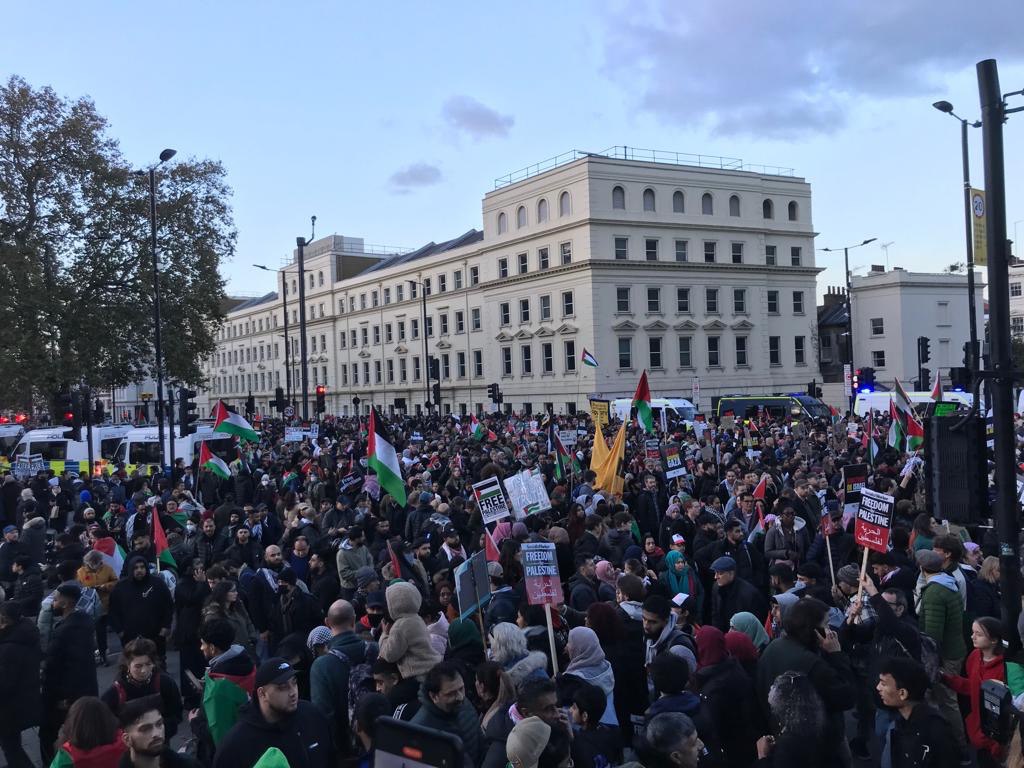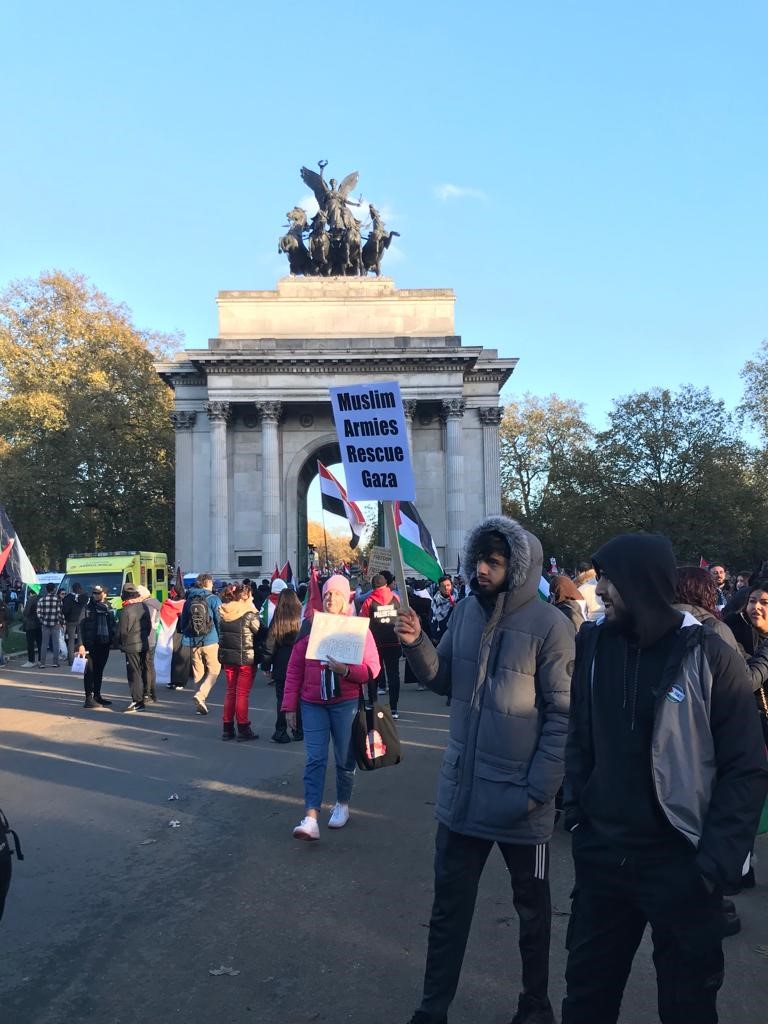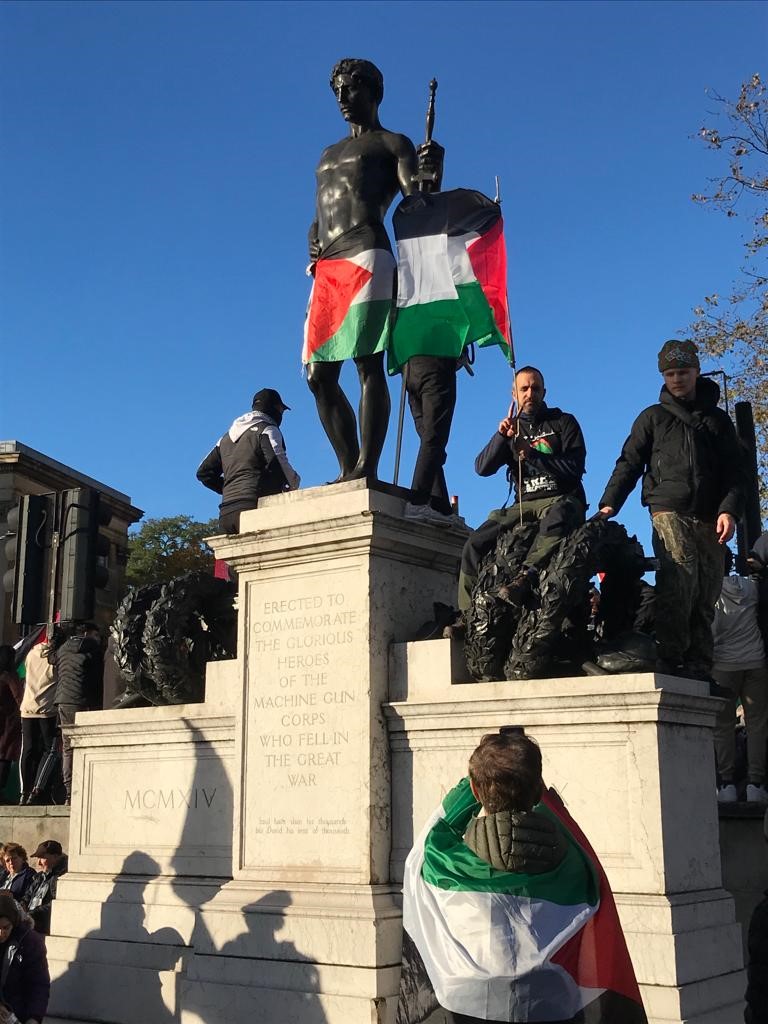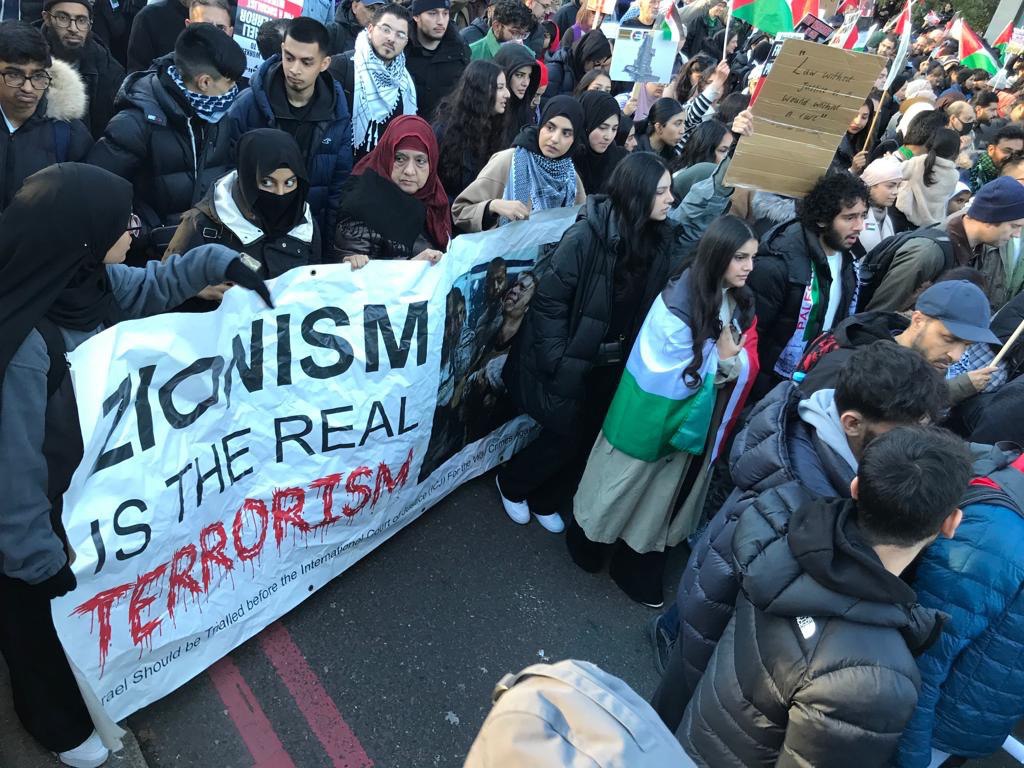Three hundred thousand protesters, many of them wearing face-hiding masks and Hamas-style headbands marched through London on Armistice Day on Saturday, November 11. It was the city’s biggest demonstration since protests against the Allied invasion of Iraq in 2003. The march was a show of force for Islamist groups that had bussed their followers into London from cities in the north of England to carry lurid and inflammatory placards and engage in public prayer in iconic locations.
“Of course, all Muslims do.”
Armistice Day protester when asked he supported the establishment of a caliphate.
Leaders of four groups organizing Saturday’s march — the Muslim Association of Britain, Friends of Al Aqsa, the Palestine Solidarity Campaign, and the Palestinian Forum in Britain, according to the Jewish Chronicle — “had apparent ties with Hamas or have expressed sympathy for its views.” Nevertheless, Sir Mark Rowley, chief of the Metropolitan Police Service (which includes London in its jurisdiction), said there were no legal grounds for banning the protest, which was routed away from Armistice Day ceremonies to commemorate the end of World War I in Whitehall, a neighborhood in central London.
Placards displayed on Saturday’s march depicted U.K. Prime Minister Rishi Sunak, U.S. President Joe Biden, and Israeli Prime Minister Benjamin Netanyahu behind blood spattered bars. Beneath the image a caption read “Wanted for Terrorism, Genocide and Crimes Against Humanity.” Another handmade sign read “Sunak is Complicit. Let’s Pay him a Visit !!!” The first protestors I spoke with carried placards that declared that “If you are silent about injustice then you have taken the side of the oppressor.”
I asked the family group if they thought the failure of Islamist groups like the Muslim Council of Britain, Muslim Engagement and Development, and the news site 5Pillars to condemn the atrocities of October 7 was unjust. A veiled young woman among them suggested that the massacre had not taken place.
“If that didn’t happen, something else would have. There have been many years and many episodes of violence and oppression,” said the young woman who added she had studied politics in college. She lamented that mainstream media reporting was biased in favor of Israel. “We’ve given up on the BBC; they report almost exclusively from Israel. We get our information from video on the ground in Gaza. They’re not looking for the hostages. That’s just an excuse to bomb thousands of civilians,” she said.

I asked a group of non-Muslim protesters why the Palestinian cause excites so much support in the UK, where the deaths of hundreds of thousands of Yemenis or Syrians at the hands of Muslim leaders typically generate little response. “Because there is a lot of information about [Gaza] on social media,” she said. “A lot of footage from the ground in Palestine.”
Another protester told me Israel’s actions generate so much attention in the UK because it is an “apartheid” state. “Gaza is a concentration camp. Do your research,” he told me.

Protestors near Wellington Arch, a venerated memorial of the Napoleonic Wars, carried signs calling for Muslim armies to “rescue” Gaza. I asked them where these armies should come from: “Everywhere – Egypt, Syria, Turkey,” one protester said. Another protester nodded in affirmation when asked if he saw resistance against Israel as a “civilizational struggle.” And when I asked another protester if he supports the establishment of a caliphate, he said, “Of course, all Muslims do.”
Protestors also scaled iconic monuments to Britain’s war heroes at Hyde Park Corner in London and draped them with Palestinian flags. Placards held above the crowd condemned UK and US leaders as “war criminals,” “puppets of Israel” with blood on their hands. Some protesters chanted, “Khaybar ya yahood,” an Arabic phrase referring to a seventh-century massacre of the Jews which many Islamists want to replicate in Israel. A female protestor in a group at Victoria station called out “Death to all Jews.”
A counter-protestor carrying a placard describing the October 7 massacre as “genocide” and Hamas as ISIS was assaulted by a group of masked pro-Palestine protestors.
Scotland Yard apologized on Monday after its officers posed for a photograph on Saturday with a child fully masked in a red keffiyeh. Officials said they were are “actively seeking” two men pictured wearing green Hamas-style headbands at Saturday’s march, a woman seen carrying a placard comparing Rishi Sunak and Suella Braverman to coconuts, and another protester seen carrying a sign showing the Jewish Star of David intertwined with a swastika above the slogan “No British politician should be a ‘friend of Israel.’” This last protester was later identified as a former Labour party activist.
Both Prime Minister Rishi Sunak and his then-Home Secretary Braverman had asked the Metropolitan Police to consider banning the demonstration after protesters shouted antisemitic chants and slogans and called for “jihad” at rallies across London and other cities the UK on successive weekends since the massacre. Metropolitan Police Commissioner Sir Mark Rowley had said officers cannot enforce “taste and decency” and laws should be changed if politicians want tougher action taken.

Police said they made 145 arrests on Saturday, mostly of far-right “counter-protestors” who clashed with police after arriving at Whitehall to protect the Cenotaph, a memorial to Britain’s war dead.
The prime minister sacked Suella Braverman as home secretary on November 13 after she accused the Metropolitan police of bias in their light touch policing of the anti-Israel marches in an Times article on November 8, the wording of which 10 Downing Street had not cleared. Braverman wrote that she did not “believe that these marches are merely a cry for help for Gaza. They are an assertion of primacy by certain groups — particularly Islamists. … We have seen with our own eyes that terrorists have been valorised, Israel has been demonised as Nazis and Jews have been threatened with further massacres.”
Taj Hargey, provost of the Oxford Institute for British Islam, said of the protests when I spoke to him a few days later, “You have all the Muslim fascists, fundamentalists and fruitcakes coming out of the woodwork in the past weeks. They want violence as an answer to it all. Unless we can discuss rationally and not resort to violence, threats and intimidations, this thing will never end. We need to have a faith that feels comfortable in this society.”
Hannah Baldock is a UK-based researcher on radicalization and terrorism.
